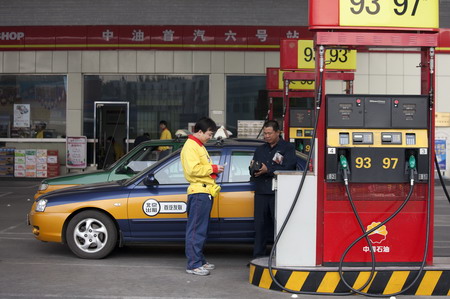China, the world’s largest oil consumer after the U.S., increased gasoline and diesel prices for the second time in less than six weeks after crude gained last month the most in a year.
Prices will rise by 600 yuan ($95) a metric ton starting today after the three crude grades tracked by the National Development and Reform Commission climbed more than 10 percent, according to a statement on the planning agency’s website yesterday. Refiners will charge 7 percent more for gasoline and 7.8 percent more for diesel, the biggest price increases in more than two years.
“This price hike comes sooner than our expectations,” said Gordon Kwan, head of regional energy research at Mirae Asset Securities Ltd. (037620) in Hong Kong. “It signals the official ending of China’s anti-inflation campaign.”
China’s biggest refiners, China Petroleum & Chemical Corp. (600028), or Sinopec, and PetroChina Co. (857), have urged the government to increase fuel prices to stem their processing losses amid rising global crude costs. After controlling tariffs last year to curb inflation, the government now has more room to maneuver after consumer prices grew at the slowest pace in 20 months. Fuel charges last increased on Feb. 8, by 300 yuan a ton, the first gain in 10 months, according to data compiled by Bloomberg.
It is “crucial” for China to ensure domestic fuel supplies by increasing prices amid the planting season and instability in the Middle East, the NDRC said. Motor fuel will rise by 0.44 yuan a liter and diesel by 0.51 yuan, it said.
Sinopec declined 2 percent to HK$8.87 as of 11:30 a.m., and PetroChina fell 1 percent to HK$11.18. The benchmark Hang Seng Index dropped 0.8 percent.
“Following the hike, the domestic margins this month would still be loss-making at $7.1 a barrel, almost similar to losses in February at $7 a barrel,” Cheng Khoo, an Hong Kong-based analyst with BNP Paribas SA, said today in a research note. Sinopec has advanced in Hong Kong trading over the past few days in anticipation of yesterday’s news, Khoo said.
Fuel tariffs “ought to be” adjusted, PetroChina Chairman Jiang Jiemin said in Beijing March 14. The company’s losses from processing crude are widening and the deficit last year was larger than the 50 billion yuan expected, he said March 5.
The tariff increase will boost Chinese oil refiners’ breakeven crude cost by $7 a barrel, according to Shi Yan, a Shanghai-based oil analyst with UOB-Kay Hian Ltd. Sinopec’s breakeven crude cost will rise to $112 a barrel while PetroChina’s will advance to $105 a barrel after the fuel price increase, said Shi.
“We are going to see some demand reduction from gasoline and diesel users against this record cost,” Shi said by phone.
Brent oil rose 11 percent in February, the biggest monthly gain since February 2011. Prices are up 2 percent this month on the ICE Futures Europe exchange in London and the futures declined 0.5 percent to $125.12 a barrel today.
The government considers changing fuel tariffs when the 22- day moving average of Brent, Dubai and Cinta crudes increases more than 4 percent from the last revision under a pricing mechanism introduced in December 2008.
The agency delayed price adjustments last year to cushion the impact on inflation, which exceeded the government’s 4 percent annual target every month. Consumer prices rose 3.2 percent in February from a year earlier, the smallest increase since June 2010.


